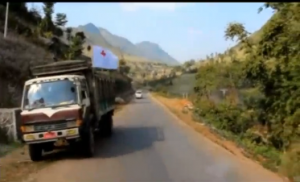Myanmar President Thein Sein declared a state of emergency in the Kokang region in the east and imposed a three-month period of martial law on Tuesday (February 17) night, hours after a Red Cross convoy came under attack.
“Tension has escalated in the area and it was found that Article 144 of Criminal Procedure alone is not effective to control chaos and to manage administration sector while lives and property of civilians are under threat from conflicts. By means of this, the State of Emergency in Kokang Self-Administered Zone is declared as per Sub-Section (a) of Section 412 of The Constitution of the Republic of the Union of Myanmar,” said a news anchor on MRTV on Wednesday (February 18) morning, repeating the previous evening’s announcement.

Earlier on Tuesday, unknown attackers shot and wounded two people in a convoy of eight vehicles marked with the emblem of the Myanmar Red Cross Society that was attempting to transport civilians displaced by fighting in Laukkai, on the Chinese border, a witness said.
A government soldier blamed the attack on the Myanmar National Democratic Alliance Army(MNDAA), an ethnic Kokang force.
Fighting broke out in the country on February 9 between the Myanmar army and the MNDAA.
At least 47 Myanmar soldiers and 26 MNDAA fighters have been killed since then, the state-backed Global New Light of Myanmar newspaper reported, and thousands of civilians have fled, either to other areas in Myanmar or over the border into China.
In 2009, fighting between the rebels and the army pushed tens of thousands of refugees into southwestern China.
The renewed clashes have alarmed China, which fears that the influx of Kokang refugees will swell, and called this week for peace on the border.
The United States, an enthusiastic supporter of reforms in Myanmar and efforts to bring about peace between the government and ethnic insurgent armies, said it was “deeply concerned” over the continued fighting, particularly by reports of the shooting of two Red Cross workers.
A spokesperson said the United States was continuing to urge national and local authorities to permit immediate and unfettered access by humanitarian workers “to provide life-saving assistance to populations in need.”
The MNDAA was formerly part of the Communist Party of Burma, a powerful Chinese-backed guerrilla force that battled the Myanmar government before splintering in 1989. (Reuters)







